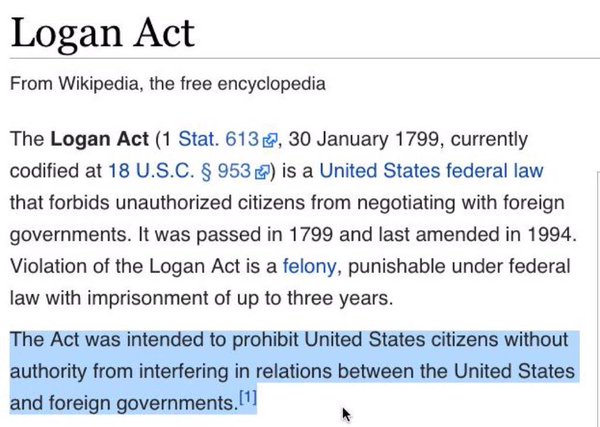In December when Michael Flynn talked with Russian Ambassador Sergey Kislyak, Flynn said it was to discuss logistics of a call between President Donald Trump and Russian President Vladimir Putin. Apparently they also discussed the sanctions imposed by outgoing President Barack Obama on Russia for their assumed and alleged “hacking” of the U.S. election in November.
By way of retaliation, based on the allegations of meddling in the election, Obama imposed sanctions that included kicking out 35 Russian officials and closing down two Russian-owned compounds in the U.S. President Putin said the next day that he had no intention of retaliating against Obama’s sanctions, but said he’d wait and deal with the Trump Administration.
Flynn, when recounting his discussion with the Russian Ambassador, obviously talked about Obama’s sanctions, but averred that he hadn’t. And technically, this was Flynn’s error – he lost the confidence of the President and the Vice President by not telling them that sanctions were in fact discussed. Even in his press conference this week President Trump said Flynn wouldn’t have been doing his job if he hadn’t discussed Obama’s sanctions. The sin was not in discussing the sanctions, the sin was in not telling his bosses that he had.
And this is where the political assassination of Michael Flynn occurred. According to the Washington Post, an intelligence source contacted them revealing, illegally, that the December 29th call between Flynn and Kislyak did include discussion of the Obama sanctions. It’s a felony to disclose intelligence data and information. And in order for an intelligence insider to leak something so inconsequential, it was obviously intended to cause political damage to the administration. There really can be no other viable explanation as to why someone in our intelligence apparatus would go public with such a disclosure.
Many have attempted to claim that Flynn violated the Logan Act, since he was not yet functioning in his new appointment as the National Security Advisor. This is a red herring. The Logan Act dates to 1799, when a state legislator with no ties to any administration tried to assert himself as a personal negotiator for final peace with France. The anti-Jefferson Federalists did not like this private initiative, so they passed the Logan Act to make private ventures intent on negotiating personal treaties over international feuds a crime. A representative of an incoming or an outgoing administration is functioning in their official, or official-to-be, capacity, and are not acting a private citizens. Apparently Flynn was addressing Obama’s sanctions against Russia, not negotiating for them. And as President Trump said this week, Flynn would not have been doing his job properly if he didn’t broach the subject of Obama’s sanctions.
One Response to “Michael Flynn Did Not Violate The Logan Act”
Sorry, the comment form is closed at this time.

There is no way any one is going to be charged under the Logan Act. The Logan Act has many problems.
1. The desuetude doctrine.
2. It is unconstitutional.
3. It fails the vagueness test as outlined by Connally v. General Construction Co.
269 U.S. 385 (1926).
4. Technically, Flynn might have been ‘allowed’ by the Presidential Transition Act of 1963.